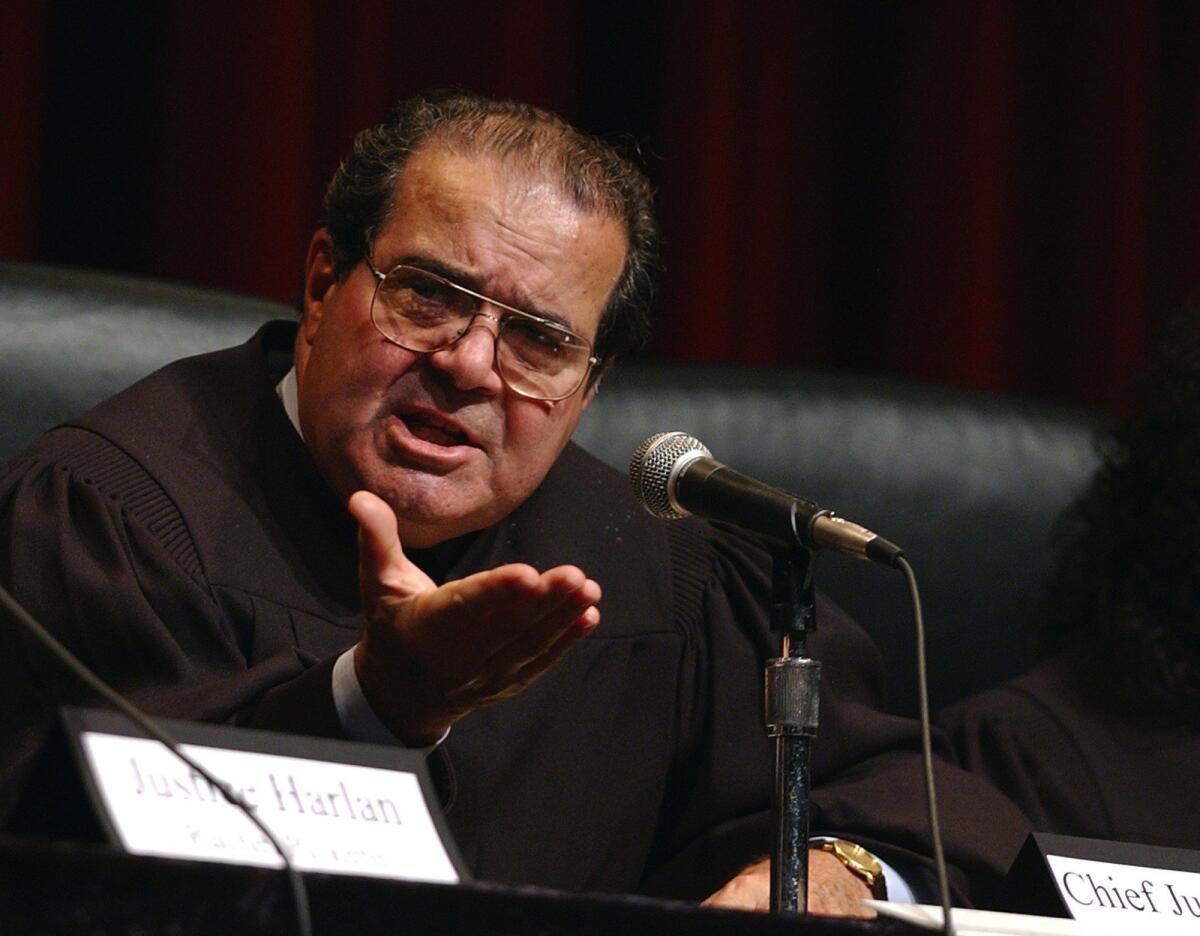Justice Scalia under fire for race comments during affirmative action argument

U.S. Supreme Court Justice Antonin Scalia said during arguments in an affirmative action case that African American students might be better served enrolling in “slower-track” colleges.
- Share via
Reporting From Washington — The Congressional Black Caucus, civil rights lawyers and Senate Minority Leader Harry Reid (D-Nev.) denounced Justice Antonin Scalia on Thursday for what they said were racist and insulting comments in which he suggested some black students might be better off in a “slower-track school” rather than at a more competitive university.
“It is deeply disturbing to hear a Supreme Court justice endorse racist ideas from the bench of the nation’s highest court,” Reid said on the Senate floor. “The only difference between the ideas endorsed by [Donald] Trump and Scalia is that Scalia has a robe and a lifetime appointment.”
Rep. G.K. Butterfield (D-N.C.), who chairs the Black Caucus, said Scalia’s comments were “disgusting, inaccurate and insulting to African Americans. Thousands of black Americans have excelled in top-tier universities.” Butterfield, a former judge, said Scalia should recuse himself from the pending University of Texas affirmative action case because he has “removed any presumption of impartiality.”
This was not the first time Scalia has made controversial comments regarding race from the bench. Two years ago, when the justices were debating the constitutionality of the Voting Rights Act, Scalia called the historic measure a “racial entitlement” that should be struck down.
Scalia has been a steady critic of race-based policies, arguing they violate the Constitution’s guarantee of equal protection. He said little during Wednesday’s oral argument for the University of Texas case until Gregory Garre, the university’s lawyer, was wrapping up his comments.
Garre, formerly a top courtroom lawyer for President George W. Bush, argued that the University of Texas should have leeway to admit qualified black and Latino students who would add diversity to the campus in Austin.
While not posing a question directly, Scalia said he questioned whether admitting more black students would benefit them or the university.
“There are those who contend that it does not benefit African Americans to get into the University of Texas where they do not do well, as opposed to having them go to a less-advanced school, a slower-track school, where they do well,” Scalia said. He cited a brief that, he said, “pointed out that most of the black scientists in this country don’t come from schools like the University of Texas. They come from lesser schools” where they do not feel they’re being pushed in classes “that are too fast for them.”
It was not clear which students Scalia was referring to. Most black students who are admitted to the UT Austin earned top grades in their high schools and were admitted on that basis. Only a small percentage of its minority students actually benefit from affirmative action.
Scalia may have been referring to the so-called mismatch theory, which contends some minority students are harmed if they are admitted to a college or law school when their test scores are considerably below their classmates. But even proponents of this theory, which remains highly controversial and much disputed, do not argue that black students in general do not do well at top universities.
Scalia also said he questioned the premise that the university “should admit as many blacks as possible.... Maybe it ought to have fewer.”
Civil rights lawyers who were there to hear the argument sat in stunned silence.
“We were alarmed and extraordinarily disappointed to hear a justice of the Supreme Court make comments that were laden with racial prejudice and that were based on an assumption of racial inferiority,” said Janai Nelson, associate director-counsel for the NAACP Legal Defense Fund. “There is no other way to slice it. To suggest African Americans are unable to compete in the competitive institutions of higher learning is insulting and blatantly contrary to the evidence.”
But Gail Heriot, a law professor at the University of San Diego and a proponent of the “mismatch” theory, said the criticism of Scalia was unfair and unfounded. “There is now quite a bit of empirical evidence that racial preferences in admissions do not do a favor to African Americans. We would have more black scientists, engineers and physicians if colleges used race-neutral policies,” said Heriot, who is a member of the U.S. Commission on Civil Rights. “We put that in an amicus brief, and I’m confident Justice Scalia was referring to that evidence.”
On Twitter: @DavidGSavage
ALSO
Iowa tow truck driver shows why Trump backers stand by him after call for Muslim ban
Democrats are campaigning aggressively on gun control, dropping longtime reticence
Middle class families, pillar of the American dream, are no longer in the majority, study finds
More to Read
Sign up for Essential California
The most important California stories and recommendations in your inbox every morning.
You may occasionally receive promotional content from the Los Angeles Times.














